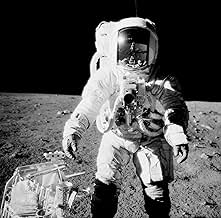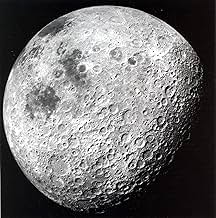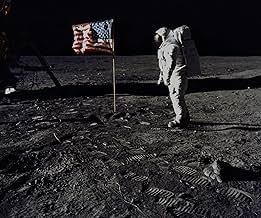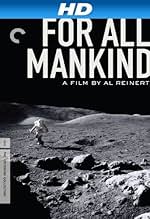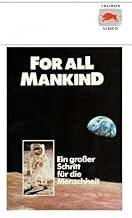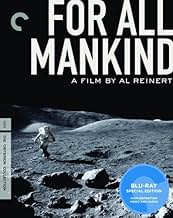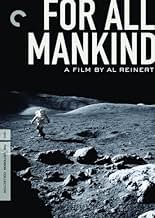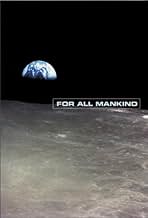AVALIAÇÃO DA IMDb
8,1/10
6,9 mil
SUA AVALIAÇÃO
Adicionar um enredo no seu idiomaAn in-depth look at various NASA moon landing missions, starting with Apollo 8.An in-depth look at various NASA moon landing missions, starting with Apollo 8.An in-depth look at various NASA moon landing missions, starting with Apollo 8.
- Indicado a 1 Oscar
- 3 vitórias e 3 indicações no total
Jim Lovell
- Narrator - Apollo 8, Apollo 13
- (narração)
- (as James A. Lovell Jr.)
Ken Mattingly
- Narrator - Apollo 16
- (narração)
- (as T. Kenneth Mattingly II)
Russell Schweickart
- Narrator - Apollo 9
- (narração)
- (as Russell L. Schweickart)
Eugene Cernan
- Narrator - Apollo 10, Apollo 17
- (narração)
- (as Eugene A. Cernan)
Mike Collins
- Narrator - Apollo 11
- (narração)
Charles Conrad
- Narrator - Apollo 12
- (narração)
- (as Charles P. Conrad Jr.)
Richard Gordon
- Narrator - Apollo 12
- (narração)
- (as Richard F. Gordon Jr.)
Alan Bean
- Narrator - Apollo 12
- (narração)
- (as Alan L. Bean)
Jack Swigert
- Narrator - Apollo 13
- (narração)
- (as John L. Swigert Jr.)
Stuart Roosa
- Narrator - Apollo 14
- (narração)
- (as Stuart A. Roosa)
James Irwin
- Narrator - Apollo 15
- (narração)
- (as James B. Irwin)
Charles Duke
- Narrator - Apollo 16
- (narração)
- (as Charles M. Duke Jr.)
Harrison Schmitt
- Narrator - Apollo 17
- (narração)
- (as Harrison H. Schmitt)
Buzz Aldrin
- Self
- (cenas de arquivo)
Bill Anders
- Self
- (cenas de arquivo)
Neil Armstrong
- Self
- (cenas de arquivo)
Stephen Bales
- Self
- (cenas de arquivo)
- (as Steve Bales)
Frank Borman
- Self
- (cenas de arquivo)
Avaliações em destaque
I won't reiterate all of the praise of this film except to say that if I had just few more spare dollars when it was released on laserdisc, I would have bought a laserdisc player just for this title (and 2001). Fortunately years later I've already purchased a DVD player and For All Mankind has finally been released on that format.
To me the defining moment of this film is the lunar lander slowly returning to the command module. At first we only see the cratered surface of the Moon moving below at incredible speed. Then we see a tiny motionless speck above it. Was it a defect in the lens? Of course not. It's the lunar lander slowly returning from the surface. It seems to take much longer than it really does because there are no cuts and no narrator explaining what we already know we're seeing. There's only a dot turning into a space ship. What more could you add to this amazing sight?
To me the defining moment of this film is the lunar lander slowly returning to the command module. At first we only see the cratered surface of the Moon moving below at incredible speed. Then we see a tiny motionless speck above it. Was it a defect in the lens? Of course not. It's the lunar lander slowly returning from the surface. It seems to take much longer than it really does because there are no cuts and no narrator explaining what we already know we're seeing. There's only a dot turning into a space ship. What more could you add to this amazing sight?
This was effective for this viewer. Usually what that means in cases like this is that it made me cry.
The hook is that it reviews its subject through the eyes of the astronauts. I was wary of this. I got involved in the program later, during the beginning of the shuttle era and even then the astronauts were pretty much there only to have been taken there. They were chosen some of them for how good they looked on newsprint.
The magic of the program and its heroes were a few visionaries and an army of competent engineers.
Yet it was effective because we see the story through the eyes of witnesses. There role here is simply as witness, and if you were alive during this time, you will be impressed at how it affects you.
There were all sorts of paths that could have been followed in this. The quest of man to explore; the mysteries of the unknown; the vast game being played by two enemies to demonstrate superiority of ideology; the hidden weapons programs.
They cover all these slightly except that last, and that's excusable because these witnesses saw none of that. But the story that dominates is the Kennedy one. Its hard to imagine today, but we loved our president and he deserved it. He was intelligent and articulate. His advisers came off not as louts or bullies, but men (and a few women) smart enough for difficult times. He was the Peace Corps president.
Kennedy promised to go to the moon and return without consulting anyone at NASA, and riding on the crest of a national enthusiasm for science and hardware. The nation really was engaged. And then he was killed, and with our rising self-doubt (Vietnam, race) we decided that as a people we owed it to him, or what he stood for. So when it happened, and the world watched, re affirmed the man and what he stood for. It was a good feeling, not pride as much as wonder about who we discovered ourselves to be.
This will evoke that same feeling again, the original tears, followed by tears of disappointment at the massive collapse of esteem which followed. A serious of botched opportunities to be worthy of the accomplishment.
Its an effective documentary in that regard, all the more so since everything was designed to be photographed, and was. If you really want to learn of this program, you need to go elsewhere, But this delivers on the promise.
Ted's Evaluation -- 3 of 3: Worth watching.
The hook is that it reviews its subject through the eyes of the astronauts. I was wary of this. I got involved in the program later, during the beginning of the shuttle era and even then the astronauts were pretty much there only to have been taken there. They were chosen some of them for how good they looked on newsprint.
The magic of the program and its heroes were a few visionaries and an army of competent engineers.
Yet it was effective because we see the story through the eyes of witnesses. There role here is simply as witness, and if you were alive during this time, you will be impressed at how it affects you.
There were all sorts of paths that could have been followed in this. The quest of man to explore; the mysteries of the unknown; the vast game being played by two enemies to demonstrate superiority of ideology; the hidden weapons programs.
They cover all these slightly except that last, and that's excusable because these witnesses saw none of that. But the story that dominates is the Kennedy one. Its hard to imagine today, but we loved our president and he deserved it. He was intelligent and articulate. His advisers came off not as louts or bullies, but men (and a few women) smart enough for difficult times. He was the Peace Corps president.
Kennedy promised to go to the moon and return without consulting anyone at NASA, and riding on the crest of a national enthusiasm for science and hardware. The nation really was engaged. And then he was killed, and with our rising self-doubt (Vietnam, race) we decided that as a people we owed it to him, or what he stood for. So when it happened, and the world watched, re affirmed the man and what he stood for. It was a good feeling, not pride as much as wonder about who we discovered ourselves to be.
This will evoke that same feeling again, the original tears, followed by tears of disappointment at the massive collapse of esteem which followed. A serious of botched opportunities to be worthy of the accomplishment.
Its an effective documentary in that regard, all the more so since everything was designed to be photographed, and was. If you really want to learn of this program, you need to go elsewhere, But this delivers on the promise.
Ted's Evaluation -- 3 of 3: Worth watching.
I saw this film at a very, very young age and I suspect that it is the reason I developed a heavy interest in space exploration. I recently saw this again for the first time in many years since all I had was a vague recollection of it. And after watching many times since then I have no problem saying that this is one of the best documentaries ever made.
One must give the film's director, Al Reinert, at a ton of credit for his work. Who else could have come up with the brilliant notion behind this film? Who would have thought of taking footage from all of the Apollo missions (and a couple of the Gemini missions) and combining them with the words of the men who went where no one had (or has since) gone before? (Apologies for paraphrasing Star Trek) The genius of this film is that it shuns away from traditional documentary styling. Instead of compiling facts on one mission and having a well known actor/actress do the narration, the film lets those who went tell the story. Who else is better qualified? They might not be professional actors, but the astronauts don't need to be. It is the power of the events they describe that is the main reason for their presence. They are a powerful voice in this story.
In many reviews I have read, I have seen complaints about the mixing of footage or the use of footage out of its context (a Gemini reentry used for the TLI burn for example). Yes the mixing is nowhere near subtle and is, thus, blatantly obvious. But it is my feeling that this mixing was necessary. The only way to get across the story of Apollo's achievement to the average person was to mix the footage. Does it really matter in the end? I mean by that this: the film isn't about a single mission to the Moon. No, the power of Apollo lies not in each mission, but in the overall effect of the Apollo program. This film is about the journey of Apollo, the effect in had on the astronauts, and the effect it had on us all.
If there is one element of this film that really stayed with men it was the music. It is among the most beautiful and haunting things you will ever here. Brian Eno does a marvelous job of conveying the mystery and majesty of both space and the Moon. This is one of those scores who really have to hear to believe.
For All Mankind, perhaps better then anything else out there, demonstrates the power of humanity in space. For one to really appreciate this film it needs to be seen on a large screen in surround sound. Only then can one appreciate both the film and the power of the Apollo legacy. This is the first film I've seen that I recommend to everyone. This is a film that is truly "For All Mankind".
One must give the film's director, Al Reinert, at a ton of credit for his work. Who else could have come up with the brilliant notion behind this film? Who would have thought of taking footage from all of the Apollo missions (and a couple of the Gemini missions) and combining them with the words of the men who went where no one had (or has since) gone before? (Apologies for paraphrasing Star Trek) The genius of this film is that it shuns away from traditional documentary styling. Instead of compiling facts on one mission and having a well known actor/actress do the narration, the film lets those who went tell the story. Who else is better qualified? They might not be professional actors, but the astronauts don't need to be. It is the power of the events they describe that is the main reason for their presence. They are a powerful voice in this story.
In many reviews I have read, I have seen complaints about the mixing of footage or the use of footage out of its context (a Gemini reentry used for the TLI burn for example). Yes the mixing is nowhere near subtle and is, thus, blatantly obvious. But it is my feeling that this mixing was necessary. The only way to get across the story of Apollo's achievement to the average person was to mix the footage. Does it really matter in the end? I mean by that this: the film isn't about a single mission to the Moon. No, the power of Apollo lies not in each mission, but in the overall effect of the Apollo program. This film is about the journey of Apollo, the effect in had on the astronauts, and the effect it had on us all.
If there is one element of this film that really stayed with men it was the music. It is among the most beautiful and haunting things you will ever here. Brian Eno does a marvelous job of conveying the mystery and majesty of both space and the Moon. This is one of those scores who really have to hear to believe.
For All Mankind, perhaps better then anything else out there, demonstrates the power of humanity in space. For one to really appreciate this film it needs to be seen on a large screen in surround sound. Only then can one appreciate both the film and the power of the Apollo legacy. This is the first film I've seen that I recommend to everyone. This is a film that is truly "For All Mankind".
Great footage, but the missions are all over the place without really telling us. If you don't have a little knowledge beforhand, like Apollo 13, you're pretty much left in the dark which mission is which and may think it was just 1 mission to the moon (and back obviously). Started to really dawn on me when Apollo 13 had that breathing problem (which was solved in a jiffy in this documentary) and then a crew was going for a moonlanding ( which obviously Appolo 13 never did. But hey when you hear the name Neil Armstrong you are pretty much back on course. Ah okay great i am seeings Apollo 11 and the first moonlanding at the moment : )
Footage: 8.5 Overall Docu : 6.
Footage: 8.5 Overall Docu : 6.
I taped this off British TV in 1989 or 1990, and could never understand why nobody I speak to has ever heard of it! Even real space enthusiasts have not seen or heard of this wonderful film. Even today it remains unavailable on DVD except in the USA (buy an import from Amazon, well worth it!).
Quite simply there is no better way to tell the story of such a unique and special journey than in the words of those who undertook it. Here we have the live radio transmissions between the astronauts and Houston, reminiscences from the astronauts a decade or so after and no interference from any professional actor/narrator. There is footage even the most obsessed space enthusiast will not have seen, especially the 8mm film shot by the astronauts themselves.
This film presents, in a mere 80 minutes, the story of the Apollo missions from pre-launch preparations though the journey, their time on the surface of the moon to the take-off from the moon and safe return to earth. The views are as majestic as any on the earth, all accompanied by soft and appropriately ethereal music.
Why this hidden gem of a film is not constantly being broadcast on a documentary channel or even entertainment stations is totally beyond me - and also beyond those I have shared the DVD with. Seek out this film and watch it. As a friend said to me, "why is it we can walk into any shop and buy row upon row of rubbish and we cannot buy this, which shows a real achievement of mankind".
Quite simply there is no better way to tell the story of such a unique and special journey than in the words of those who undertook it. Here we have the live radio transmissions between the astronauts and Houston, reminiscences from the astronauts a decade or so after and no interference from any professional actor/narrator. There is footage even the most obsessed space enthusiast will not have seen, especially the 8mm film shot by the astronauts themselves.
This film presents, in a mere 80 minutes, the story of the Apollo missions from pre-launch preparations though the journey, their time on the surface of the moon to the take-off from the moon and safe return to earth. The views are as majestic as any on the earth, all accompanied by soft and appropriately ethereal music.
Why this hidden gem of a film is not constantly being broadcast on a documentary channel or even entertainment stations is totally beyond me - and also beyond those I have shared the DVD with. Seek out this film and watch it. As a friend said to me, "why is it we can walk into any shop and buy row upon row of rubbish and we cannot buy this, which shows a real achievement of mankind".
Você sabia?
- CuriosidadesThe staging footage was captured because NASA wanted to document the flight process of an unmanned Saturn flight for feedback in case there was a failure for engineers to look at footage to see what went wrong. Cameras were mounted in strategic locations, kicking on at critical moments to document the staging process for less than half a minute. After completion, the light-tight canisters containing the exposed film were jettisoned, dropping to earth with homing beacons and parachutes inside protective heat shields. Air Force C-130 transport planes, towing gigantic nets, recovered the canisters in the southern Atlantic Ocean.
- Erros de gravaçãoThe opening of the documentary incorrectly states that: "During the four year between December 1968 and November 1972, there were nine manned flights to the moon." The last lunar mission, Apollo 17, took place in December 1972.
- Citações
Charles M. Duke Jr.: The only bad part about zero gravity in Apollo was goin' to the bathroom. We had a very crude system. For your feces it was a bag, and you put this bag in the right position. So you go, but the only thing is that nothing goes to the bottom of the bag in zero gravity.
- Cenas durante ou pós-créditosFilmed on location by the United States National Aeronautics and Space Administration.
- Trilhas sonorasSirens
Courtesy of Opal Records (Music For Films III)
Written and Performed by Daniel Lanois and Brian Eno
Licensed by Upala Music/Hamstein (BMI)
Principais escolhas
Faça login para avaliar e ver a lista de recomendações personalizadas
- How long is For All Mankind?Fornecido pela Alexa
Detalhes
- Data de lançamento
- País de origem
- Idioma
- Também conhecido como
- For All Mankind
- Locações de filme
- Sea of Tranquility, The Moon, Space(Apollo 11 landing site)
- Empresas de produção
- Consulte mais créditos da empresa na IMDbPro
Bilheteria
- Faturamento bruto nos EUA e Canadá
- US$ 770.132
- Fim de semana de estreia nos EUA e Canadá
- US$ 33.777
- 5 de nov. de 1989
- Faturamento bruto mundial
- US$ 770.366
- Tempo de duração1 hora 20 minutos
- Cor
- Mixagem de som
- Proporção
- 1.37 : 1
Contribua para esta página
Sugerir uma alteração ou adicionar conteúdo ausente

Principal brecha
By what name was Para Toda Uma Humanidade (1989) officially released in India in English?
Responda


